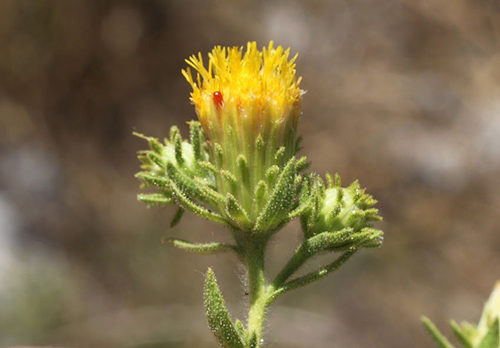Contents
The use of the rock’s tea plant is quite widespread in the Spanish region of Aragon. Herbal teas (infusions) made with this plant are highly valued. They have a slight camphor aroma and a mildly bitter flavor. Rock’s tea can substitute everyday tea and is better than the latter.
The great Greek physician, pharmacologist, botanist, author Pedanius Dioscorides, and other classic authors did not know about rock tea because it did not grow in eastern Mediterranean regions.

Rock’s Tea Plant Scientific Facts
- Scientific name: Jasonia glutinosa (L.) D.C.
- French: The vert.
- Spanish: Te de Roca.
- Environment: Common in western Mediterranean countries, especially in mountainous forests. It is found in cracks on calcareous rocks.
- Description: This vibrant plant of the Compositae family consists of a small woody base from which several stems grow 20 to 40 cm high in the Spring every year. The whole plant is sticky and hairy. Its small and yellow flowers gather in flower heads on the tip of the stems.
- Parts of the plant used medicinally: The leaves and flower heads.
Healing Properties and Indications

The rock’s tea plant composition is not well-known; however, it has been proven that it does not contain caffeine or theine. It comprises an essence that gives the plant digestive properties and abundant tannins that have antidiarrheic properties.
- Digestive problems: The rock’s tea plant is popularly used for upset stomach, indigestion, slow, heavy digestion, diarrhea, and intestinal fermentation.
- Nervous problems: It also has a stimulating action, lacking any irritant effects on the nervous system, unlike coffee or tea.
How to use Rock’s Tea
- Infusion with 20-40g of plant per liter of water. Drink up to five cups daily after meals.
DISCLAIMER: All content on this website is presented solely for educational and informational objectives. Do not rely on the information provided as a replacement for advice, diagnosis, or treatment from a qualified medical expert. If you are pregnant, nursing, or have any preexisting medical concerns, talk to your doctor before using any herbal or natural medicines.
REFERENCES
George D. Pamplona-Roger, M.D. “Encyclopedia of Medicinal Plants.” George D. Pamplona-Roger, M.D. Encyclopedia of Medicinal Plants. Ed. Francesc X. Gelabert. vols. 2 San Fernando de Henares: Editorial Safeliz, 2000. 456. Print. [rock’s tea plant]
